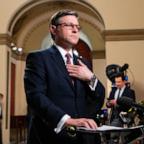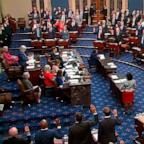Moderates in Congress feel health care push
WASHINGTON -- As Congress considers an overhaul of the nation's health care system, pressure is mounting on a small circle of Senate moderates who helped advance President Obama's economic stimulus this year.
Centrists in both parties, including Sen. Susan Collins, R-Maine, and Sen. Ben Nelson, D-Neb. — both of whom played a critical role in shaping the stimulus — are being courted by interest groups and the White House as lawmakers seek a way to provide health care to 46 million uninsured people.
"On the Senate side, there is more outreach … to Republicans than was the case during the early days of the stimulus," said Collins, who said she has heard frequently from the administration and Sen. Max Baucus, D-Mont., a key architect of the health care effort. "It's in everyone's interest to try to advance a bipartisan bill."
Baucus, chairman of the Senate Finance Committee, said he hopes to have a draft bill this month. A separate proposal by Sen. Edward Kennedy, D-Mass., began circulating last week. Lawmakers have negotiated for weeks over controversial provisions such as a government-run insurance program and how to pay for the more than $1 trillion the proposal may cost.
Democrats, including Baucus, say they want Republican support, but the effort has been strained as the White House has pushed aggressively for a government plan.
Nine Republicans on the Finance Committee sent a letter to Obama, released Monday, arguing that such a plan would lead to "a federal government takeover of our health care system."
The only GOP member of the committee who did not sign the letter is a moderate: Sen. Olympia Snowe of Maine.
If Democrats want Republican support, they will probably need 60 votes, the threshold required to stop filibusters and proceed to a final vote. Democrats can count on 59 votes, but it is not clear whether all Democrats will vote for whatever proposal emerges.
"I assume they'll place a great emphasis on trying to get to 60 votes, in which case moderate support will be very important," said Sen. Evan Bayh, D-Ind., who formed a coalition of centrist Democratic senators in March. "That's the ideal situation."




